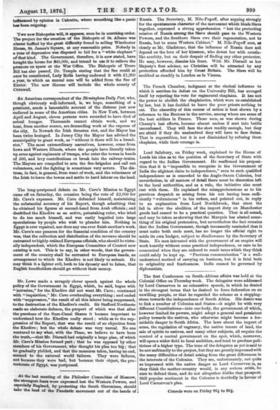Lord Salisbury, on Friday week, explained to the House of
Lords his idea as to the position of the Secretary of State with. regard to the Indian Government. He reaffirmed his proposi- tion that it is "impossible to recognise in the Government of India the slightest claim to independence," even to such qualified independence as is conceded to the Anglo-Saxon Colonies, but nevertheless, in all matters of detail there must be discretion left to the local authorities, and as a rule, the initiative also must rest with them. He explained the misapprehensions as to his previous despatch as arising from his not having been suffi- ciently " voluminous " in his orders, and pointed out, in reply to an explanation from Lord Northbrook, that since the fall in silver the abolition of the import duty on Manchester goods had ceased to be a practical question. That is all sound, and may be taken as showing that the Marquis has abated some- thing of his original pretension, but nevertheless the fact remains that the Indian Government, though incessantly reminded that it must make both ends meet, has no longer the official right to settle its own budget, subject to disallowance by the Secretary of State. No men intrusted with the government of an empire will work heartily without some practical independence, or care to be economical when they are ordered to remit taxes which they think could safely be kept up. "Previous communication" is a well- understood method of carrying on business, but it is fatal both to originality and fearlessness. India cannot be governed by diplomatists.






























 Previous page
Previous page